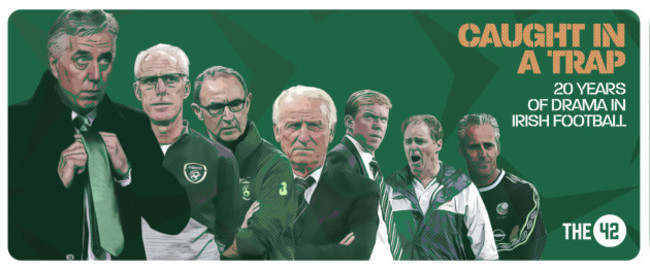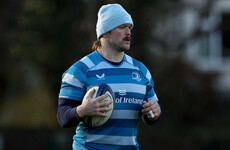Giovanni Trapattoni was charming, ruthless, wily, humble, stubborn and funny. Sadly his press conferences were more entertaining than the majority of Ireland’s games during his tenure. In today’s chapter in our series on Irish football, Garry Doyle looks back at the Italian’s five years in charge and speaks to the people who knew him best.
THE LAST OF the sunlight is threatening to go out. He has lived through a World War, moon landings, 15 World Cups and 49 years in this weird old industry. Once he rubbed shoulders with Pele and Cruyff before telling Platini, Boniek and Baggio what to do and when to do it. Now his world had narrowed to this: SK Sturm Graz on a Wednesday, SV Ried on a Saturday.
Sixty-eight years old and staring at the calendar – SV Mattersburg, Austria Vienna and Altach in February; Innsbruck, Linz and Karnten in March, the last of those games coming the day after St Patrick’s Day 2008, his 69th birthday. It’s time to reflect, time to plan.
This isn’t Serie A, the league he won twice as a player, six times as a manager. It isn’t even the German Bundesliga, the trophy he lifted with Bayern Munich. This is the Austrian Bundesliga where the crowds are average, the football worse. No one in Italy really cares what goes on here.
So when the call comes, he listens. The closed door is now ajar. Ireland want him, Liam Brady’s Ireland. He thinks a little. He Googles their World Cup group. Bulgaria, Cyprus, Georgia, Montenegro – winnable games. Then he looks again at the top seeds: Italy.
“Let’s do this deal,” he says.
**
Don Givens runs his finger down the shortlist of candidates. Billy Davies. Lawrie Sanchez. Gerard Houllier. Terry Venables. Steve Coppell. A few months earlier John Giles had sat down for a coffee with Paul Jewell to see if he fancied applying for the gig. Derby County is where Jewell ends up.
Now Givens, Ray Houghton and Don Howe are the ones sipping coffee on behalf of the FAI, the three men tasked with the job of finding Ireland a new manager.
Howe has contacts. David Dein is a friend of his, Dein the man regarded as the best recruiter in the business, having plucked George Graham from Millwall, Arsene Wenger from obscurity.
The former Arsenal vice-chairman suggests Trapattoni, once Europe’s most sought-after manager, now operating out of Red Bull Salzburg.
Nearly three months had passed since Steve Staunton’s sacking and after Coppell withdrew his candidacy, it was turning into the longest of winters. Then, with a flick of a switch, the landscape changed. Trapattoni was interested. It was an easy deal to seal, an even easier pitch to sell to the Irish public.
**
November 2009 and the dressing door is closed. Trapattoni strides purposely to the middle of the floor and looks around. Ireland had lost the first-leg of their World Cup play-off to a deflected Nicolas Anelka goal. Now they’re here, in the Stade de France, 1-0 down.
The scoreline isn’t the only issue. This is the World Cup when Fifa make a late decision to seed teams in the play-offs, having previously indicated that an open draw would be used to determine who met who.
Shay Given is raging.
It’s totally unfair on us smaller nations,” he says. “If they say that before a ball is kicked then at least you know the picture, you know exactly where you stand but to change it now is absolutely ridiculous and I don’t think it’s right at all.”
Trapattoni agrees. “Tonight boys, it is us against France and against Fifa,” he tells the team before kick-off.
“He always did that sort of thing against the big teams,” Stephen Hunt says now. “He was always the boss. He had this aura. You’d never go and have a general conversation with him, the way you would with some managers. He had his ways and as a player you adapted your game if you wanted to get picked. I knew what he wanted me to do so that was that. I did what I was told. Ah, he was great. Big matches, France in Paris, Italy in Bari, he got us going.”
It wasn’t just Hunt who liked Trapattoni. After missing out on qualification in 2004, 2006 and 2008, a generation of players knew they had one last chance of making it to a World Cup. They were realists, too. The Trap way, full-backs chained to the half-way line, wingers told to clock up the miles, wasn’t pretty but it was effective.
“He’d show us stuff before games, the goals we’d scored, lots of them coming from long balls,” says Keith Fahey, who won all of his Ireland caps under Trapattoni. “He knew what our strengths were and got his message across properly. I loved playing under him.”
Others barely got the chance. Andy Reid and Wes Hoolahan were casualties of the system; Stephen Ireland chose not to become a part of it. All three were cause célèbres. But Trapattoni listened to the criticism and didn’t care.
“I know your jobs (sic),” he gently told your correspondent in one memorable putdown. “You write. I know. I know.
“But you write and I win. I win big trophies, many, many times. Inter. Juventus. Bayern. I know football.” It was hard to argue. In his managerial career, he was one of only two men to have won the European Cup, Cup Winners Cup and UEFA Cup. In contrast, the only thing your correspondent ever won as a coach was a crate of Carlsberg from a Trinity five-a-side.
“He was a fireball,” Hunt says. “The warm-up, which he often joined in, was part of the act. The high-knees. That was his way of saying, ‘don’t judge me by my age’. He was completely in charge. When we did set-piece sessions in training, he’d really come alive, especially if someone wasn’t concentrating. You’d hear about it from him. We had a way of playing. It worked.”
Well, for three years it did. In Paris, after taking on ‘the French and Fifa’, Ireland produced their best performance in years, taking the game to extra-time, losing out when Thierry Henry’s blatant handball went unpunished in the lead-up to William Gallas’ goal-changing equaliser. Ireland were out and Trapattoni was fuming.
“We all had tears in our eyes,” Manuela Spinelli, his interpreter during the Ireland years, says. “Even Trap had. He didn’t come out of the dressing room for a very long time and when he eventually did, he sent such a powerful message that night to Fifa.
“Think about it. Trap was always a diplomat. But there’d been an injustice and he used all his weight, the power of his CV, to send out a message. He was deeply annoyed by what happened.”
He could have left after that game but didn’t want to. “Giovanni is like the Pope,” Manuela says. “I know because I’ve worked with both men. I remember the game in Bari (a 1-1 draw with Italy in the World Cup qualifiers). He was in his element that night because he was back home, getting a good result. After the game, when we walked through the stadium to the press conference room, this entourage of people just gathered around and followed after him. It really was Pope-like.”
The Pope-like figure could have left then to preach to a new flock. But Ireland suited him. The job was ridiculously well paid; the team offered a ticket to the big time; the Irish public offered him respect without being intrusive. “In Italy, Giovanni’s a celebrity but here, he was left alone,” Manuela says. “People gave him his distance but still found him approachable. He’s a people person. He really, really liked Ireland and its people.”
So he signed a new deal and got to another play-off. This time the opposition came from a different part of Europe and the bottom end of the rankings. Estonia were poor and Ireland destroyed them. “Well, maybe you should give us a bit more credit for that win,” Hunt says. “It was a play-off, after all. Going away from home in a play-off, you’d be delighted with a 1-0 win. We put four past them. We were at our peak in 2011. The Euros came a year too late for us.”
**
It was a reign of two halves. In part one Ireland moved from a loose fitting tactical approach into a straightjacket. As early as the day he was unveiled at the RDS, Trapattoni outlined his plans.
He was three-and-a-half hours into a series of Press interviews when he was up off his feet, animatedly re-enacting scenes from Ireland’s doomed Euro 2008 qualification campaign, using bottles of water and Lucozade Sport as his props. Corners, throw-ins, set-pieces would become the framework of his plan.
The Algarve training camp in 2008 was where the players first got to know his quirks. Starting at the breakfast table, they arrived down early to see him waving his arms around like an amateur dramatist. The issue? Mushrooms were on the menu.
“He was convinced they were bad for you,” Manuela says, laughing.
“What the hell are you eating mushrooms for?” Trapattoni shouted at the players standing around the breakfast buffet. “You are meant to be athletes.”
Later that day, they played a practice match in Lagos against a local team, drawing 1-1. Perturbed by what he saw, he took a member of his backroom staff aside to try and explain his point. Soon the scene resembled a game of charades, Trapattoni walking backwards to try and demonstrate the word he was looking for.
“Moonwalk?” asked one of the backroom staff members, a glint in his eye.
“No,” Trapattoni said, laughing before he re-enacted his point again, gesticulating wildly. “Here half-way line, there (he pointed to the other end of the room), penalty box. We need wingers go there.”
“Ah tracking back,” the staff member said.
“That’s it,” replied Trapattoni, pointing his finger at the staff member. “Tracking back. Very good. That’s it.”
Language may have been an issue but communication wasn’t. “Definitely not,” says Fahey. “He could be a bit eccentric and could say something at a training session that I wouldn’t necessarily know what he meant. But I’d always get the passion and would always get the message. Let’s be clear, here. There was never once a point where we didn’t know our job going onto the pitch. He was a real leader.”
It showed. In his first two qualification campaigns, Ireland lost just two of their 24 games, staying unbeaten on all 12 road-trips.
There was fun. Once, before Ireland played Bulgaria in Croke Park, he was getting hounded about Andy Reid’s continued exclusion from the squad. It was the recurring theme of his first campaign. A journalist asked a question.
“You must be from Bulgaria?” Trap asked, with a dead-pan expression.
“Cork, actually,” the reporter replied.
And there was irritation. At home against Italy, Ireland took a 2-1 lead with three minutes left. Then Alberto Gilardino joined the 90-minute club, an ever expanding group of players whose last minute equalisers turned Irish victories into draws. Macedonia’s Goran Stavrevski set up the group in 1999, Israel’s Abbas Suan was added to it in ’05 and Slovakia’s Marek Cech was inducted in 2007, two years before Gilardino broke Irish hearts at Croke Park. “That was a huge moment for Trap,” says a backroom staffer. “He couldn’t believe how naïve our players had been in those closing minutes. And he never let them forget it.”
**
It was approaching 11pm when Trapattoni took his seat in the dressing room of Poznan’s Municipal Stadium.
Night had fallen — and so had his team, beaten 2-0 by Italy, the third time they had lost within a week. The 2012 European Championship, which had promised so much, had delivered so little: three games, one goal scored, nine conceded. No points. They were the worst team in the tournament.
So against this backdrop, emotions were raw. Silence filled the room, broken only by the movements of the kit-men, Mick Lawlor and Dick Redmond, who were packing away the last of the socks and shorts.
Soon they would leave and Trapattoni would touch the arm of one of his most trusted back-room members and gesture for him to stay and chat. The mask of confidence — one he had worn so publicly for so long — had slipped to expose a rare show of vulnerability. After Moscow in 2011, when Richard Dunne had the game of his life as Ireland secured a 0-0 draw, Trap had grabbed a staff member by the collar, wild-eyed like a boxer leaving the ring after a fight. “We achieved miracles out there,” Trapattoni said. “Miracles.”
Now he was down on himself, quietly asking his confidant — maybe even himself — “Where do I go from here?”
And the answer was nowhere. Sitting on a fat salary, he had no reason to resign. And after his momentary weakness, the old Trapattoni, the old fighter would return. Boxers, they say, are the last ones to know when to quit. Well, you can add football managers to that list.
His team went into decline, that final campaign seeing him claim 11 points from eight games – nine of those coming against Kazakhstan and the Faroe Islands. They were humiliated 6-1 by Germany before middling Swedish and Austrian teams completed his misery.
When pitted against heavier hitters, the team did not have enough ideas. And nor did he. The manager, paid the big bucks to make shrewd decisions, simply did not have a back-up plan. That night away to the Italians in Bari, when he made three timely substitutions and changed formation midway through the first-half, was the one time this conservative tactician walked across the chamber to sit with the radicals. “He trusted the morale of the Irish players,” one staff member says. “I’m not sure he trusted their technical ability.”
Ironically the final night of his reign, and career, came in Austria — the same country where he had met the FAI’s recruitment team some five years earlier. “If I was John Delaney, I would back me,” he said that night, half an hour after his team had been beaten 1-0. The words went unheard, though, as the following day, the FAI issued him with his P45.
Two other things happened that week. In the dressing room after the game, Seamus Coleman spoke up. “We should have won that game,” he shouted, “should have got at them more.” No one interrupted. Everyone listened. “A big, big speech,” our source who was in that dressing room tells us. “We’d never seen Seamus like that before. Giovanni was impressed.”
Three years would pass before the captaincy was handed over to Coleman by Martin O’Neill, Trapattoni’s successor, but this was the night everyone knew the Evertonian was officer material.
Coleman was also a graduate from the League of Ireland and a day earlier Trapattoni had made a contentious claim. “Austria has a league, Sweden has a league,” he said. “Ireland has no league.”
For many Irish fans, those were the defining words of his reign.
- Tomorrow at 8am: League of Ireland special: ‘the country with no league’



















Along with Stan, a terrible appointment. But worse was to come
@Trevor: Trap was an improvement over ‘the gaffer’ stan, O’Neill was an improvement over trap. Now hopefully Kenny will be an improvement on O’Neill
@Trevor: wouldn’t agree there,trap was a top pedigree manager hes record speaks for itself.he completely turned the team around after the Stan era made us very hard to beat and we had two great qualification campaigns,obviously the wheels came off at the end but we had some bad luck on the way also been drawn in one of the hardest groups possible in the euros 2012,and the henry shambles.
@Trevor: not entirely true, his record in the first two campaigns was strong just two losses from 24 games.
@Pauly Kells: I would agree with you . The Irish teams seem to have very bad luck through the years , very questionable ref decisions and as you say that hand ball decision by Henry , decisions went against those managers , Eoin Hand ,Trap , etc … Mick McCarthy through not finishing his role . And people talk about “luck of the Irish “
@Trevor: worse to come in who ?
@Trevor: I rather think that’s an exceptionally harsh assessment of Trap’s tenure. He got us to two play-offs and one major tournament. His win % was better than O’Neill’s and only marginally worse than McCarthy’s first reign (he got us to the same number of tournies as McCarthy, remember). As someone pointed out above he made us hard to beat (mostly) and his loosing % is only bettered by McCarthy (2nd term), Kerr and Charlton. He also gave debuts to the likes of Coleman, McClean, and Hoolahan (albeit maybe late) and got some great performances out of otherwise weak players like Cox, Greene, and Lawrence.
Didn’t like his style and I think he is a flawed international manager, but a great club manager. But to say ‘along with Stan’ I think is very harsh.
Trap was a great admirer of Simon Cox.As he said himself ” I love Cox”.
Trapp didn’t trust the irish players he really would have been more suited to the team Jack had and Jack would have been more suited to the team Trapp had they would have both got the best out of their teams .Jack couldnd manage skill and Trapp had difficulty managing mediocrity
Possible the most over hyped manager ever very negative , along with Stan took Ireland back 50 years